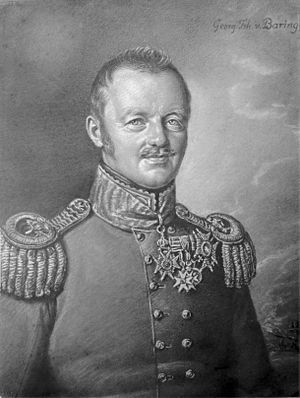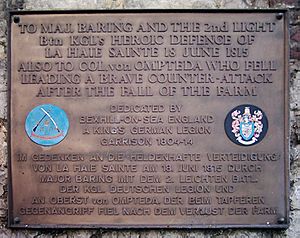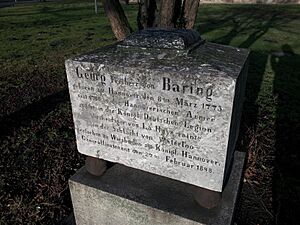Georg Baring facts for kids
Konrad Ludwig Georg Baring was a brave soldier who lived from 1773 to 1848. He was an officer in the army of Hannover and later joined the British army's special group called the King's German Legion. You might also see his name written as Baron Georg von Baring.
Contents
Georg Baring's Military Career
Early Years in the Army
Georg Baring started his military journey in 1787, joining the Hanoverian Army. In 1803, he became one of the first members of a new group called the King's Germans. This group was soon renamed the King's German Legion.
Baring fought in many important battles and campaigns:
- In Hannover (1805) during the Third Coalition war.
- Around the Baltic Sea (1807–1808) in the Gunboat War.
- In the Pyrenees mountains (1808–1813) during the Peninsular War.
- The Walcheren Campaign (1809) as part of the Fifth Coalition.
- Southern France (1813–1814) and the Netherlands (1814) during the Sixth Coalition.
He was slightly hurt in the Battle of Albuera in 1811. By 1815, he had been promoted to lieutenant colonel.
Defending La Haye Sainte at Waterloo
One of Baring's most famous moments was at the Battle of Waterloo on June 18, 1815. He led the 2nd Light Infantry Battalion of the King's German Legion. His job was to defend a farmhouse called La Haye Sainte. This farmhouse was a very important spot on the battlefield.
Baring later wrote a detailed report about that day. He described how tough the fighting was. Out of 400 men he started with, only 42 were left at the end of the battle. Many of his friends and comrades were lost. He mentioned burying brave soldiers, including the brigade commander, Oberst Christian Friedrich Wilhelm von Ompteda. After the battle, his tired men recovered and then continued to chase the enemy.
Life After the War
After the Battle of Waterloo, the King's German Legion was disbanded. Baring then joined the new army of the Kingdom of Hanover. He continued to rise through the ranks.
In 1828, he became an oberst (a high-ranking officer) in the Garde-Grenadier-Regiment. He also worked in the general staff. In 1831, he published a story about his battalion's part in the Battle of Waterloo.
On June 18, 1832, exactly 17 years after Waterloo, King William IV honored him. Baring and his family were made Freiherrs, which is a noble title, because of his bravery in the war. He also became the city commander of Hanover. He was promoted to Generalmajor in 1834 and then to Generalleutnant in 1846.
Remembering Georg Baring
There is a street named after Georg Baring in the city center of Hanover. A small memorial stone also honors him. It is located near the Hauptstaatsarchiv Hannover, which is close to the current regional parliament building.
Awards and Honours
Georg Baring received several important awards for his service:
- United Kingdom
- CB – Knight Companion of the Order of the Bath
- Waterloo Medal
- Kingdom of Hannover
- Royal Guelphic Order, 2nd class
- King William Cross
- Kingdom of the Netherlands
- Military William Order, 3rd class
 | Charles R. Drew |
 | Benjamin Banneker |
 | Jane C. Wright |
 | Roger Arliner Young |




